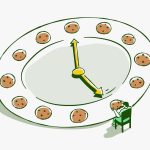Sleep apnea could quietly harm the brain, even in healthy men
Most people think of sleep apnea as just loud snoring or restless nights, but new research shows it can quietly harm the brain, even...
Common sleep supplement may raise heart failure risk
People who take melatonin regularly to help them sleep may be putting their heart health at risk, according to new research presented at the...
Moderate to severe sleep apnea may raise risk of brain bleeds
A new study from Korea University Ansan Hospital has found that moderate to severe obstructive sleep apnea could increase the risk of tiny brain...
Time-restricted eating alters sleep patterns but doesn’t boost metabolic health, study finds
Intermittent fasting, often called time-restricted eating (TRE), has become a popular way to lose weight and boost health.
Many people believe that limiting eating to...
Why sleep apnea is linked to high blood pressure
Sleep apnea is a condition that affects nearly 40 million adults in the United States. Many people with sleep apnea use machines called CPAPs...
Avoiding sleep meds can help older people live longer
Many older Americans take prescription medications to help them sleep. These drugs include benzodiazepines and newer medications known as “Z-drugs,” like Ambien.
While they may...
New drug combo could treat sleep apnea more effectively
A new study led by researchers from Monash University and Harvard has shown that using a combination of treatments for sleep apnea could be...
Why ignoring your body clock can strongly harm your heart
In today’s busy world, many people stay up late, work overnight shifts, or spend hours in front of screens long after sunset.
These modern habits...
Weight-loss drugs like Ozempic may lower death risk in sleep apnea
Popular weight-loss drugs like Ozempic and Zepbound may offer more than just help shedding extra pounds—they might also help protect people from serious health...
Living half-asleep: what people with idiopathic hypersomnia want you to know
Idiopathic hypersomnia, often called IH, is a rare and serious condition that causes people to feel extremely sleepy during the day, even after they...










